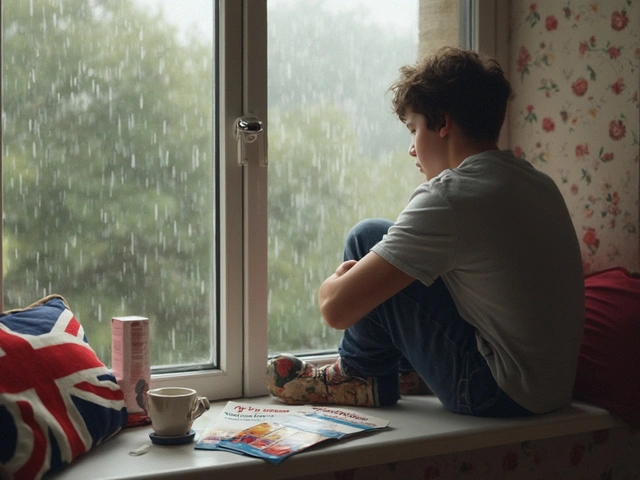No one really talks about how brutal acne can get until you’re stuck avoiding eye contact or hiding behind layers of makeup that feel more like armor. Accutane isn’t just another face wash that promises miracles in a few weeks—it’s the nuclear option for stubborn, cystic acne, the kind that laughs at over-the-counter stuff and rolls its eyes at homemade remedies. Behind the medical name (isotretinoin) and all the horror stories floating around Reddit and TikTok, there’s a real solution for people who feel like nothing else works. But Accutane isn’t a quick fix or a gentle ride. It’s life-altering—sometimes in the best way, sometimes in ways that catch you completely off guard.
What Really Is Accutane? Understanding Isotretinoin at Its Core
Accutane is a brand name, but the real player here is isotretinoin—a powerful vitamin A derivative. It’s been around since the 1980s, prescribed for the gnarliest cases of acne, especially stuff with deep cysts that leave scars no filter can hide. This isn’t your everyday retinol cream. Isotretinoin works by shrinking the sebaceous glands in your skin. These glands pump out sebum, the oily stuff that, when mixed with dead skin and bacteria, leads to clogged pores and, eventually, the kind of acne that makes you dread selfies.
Prescription rules for Accutane are strict for a reason. The FDA has a Risk Evaluation and Mitigation Strategy (REMS) called iPledge to ensure people understand what they’re getting into. That’s because Accutane comes with several serious warnings—most critically, its danger during pregnancy. Just one pill can cause severe birth defects, so doctors and pharmacists are hyper vigilant about making sure anyone who can become pregnant uses two forms of birth control and gets monthly pregnancy tests. Even just picking up a prescription feels like a high-stakes mission.
Another wild fact: isotretinoin originally came about as a chemotherapy drug for skin cancer, but doctors noticed their patients’ acne absolutely vanished. That accidental discovery changed dermatology forever. But its effectiveness doesn’t mean zero risks. Doctors prescribe it when other treatments—topical creams, antibiotics, even hormonal therapies—haven’t made a dent. There’s a good reason they call Accutane the big guns.
When Accutane enters your system, it gets to work reducing oil output by up to 90%. This dries up the environment acne bacteria love. You might even notice your hair dries out or your lips chap—because your skin isn’t pumping out much oil at all. The treatment usually lasts four to six months and, while some people need a second round, the majority who stick with the program see long-term results. But this is serious business. Monthly blood tests check your liver and cholesterol, and dermatologists monitor you closely for side effects and mood changes. All those doctor appointments are a sign of how powerful (and potentially risky) this drug really is.
The Good, The Bad, and The Ugly: Side Effects You Need to Know
The first thing people want to know: is Accutane worth it? Honestly, it can be life-changing, but the side effects pack a punch. Most folks hear about the classic dryness—lips that peel like you just tried eating jalapeños, skin that burns when you look at a towel. Chapped lips are so universal that Aquaphor basically becomes your best friend. But there’s a whole list of other things you might not expect.
Mood swings are a hot topic. Some users feel totally fine mentally, while others report increased anxiety or depression. The science hasn’t settled the debate, but doctors take it seriously and ask about mood at every visit. Some dermatologists even check in weekly just in case. One person’s experience can be totally different from another’s, which leads to a lot of internet stories, both terrifying and reassuring. If you have a history of mood disorders, bring it up right away, not after things get weird.
Your joints and muscles might ache more than usual, especially if you’re active. Isotretinoin can temporarily mess with how your body repairs itself after workouts, so try not to go all out training for a marathon while you’re on it. Some people get eczema-like rashes, nosebleeds from the dry air, and extra sun sensitivity—think sunburns in half the time. There are even less common reactions, like vision changes, hearing issues, or hair thinning. Luckily, most side effects fade after you complete your round, but it feels like a marathon in the moment.
The liver and blood parameters don’t get as much attention, but doctors obsess over them behind the scenes. Your cholesterol might climb, so don’t be surprised if you need a few blood draws. Eating a little less greasy junk food during your course can help, though, honestly, cravings don’t exactly disappear.
Yet for many, the idea of finally having clear skin for the first time since middle school is worth every dry patch. If you’re nervous, you’re not alone. Every single side effect shouldn’t scare you off, but it’s smart to be realistic and ready to check in with your dermatologist about anything that feels off. Most Accutane users experiment with tricks: sleeping with a humidifier, switching to ultra-gentle skin care, and stashing lip balm everywhere from backpacks to car cup holders. If you skip moisturizer or lip balm for even one day, you’ll notice.

Daily Life on Accutane: Real-World Tips and Hacks
Treating your skin to Accutane is no ordinary routine—expect your products to change, your bathroom cabinet to get a total glow-up, and your lifestyle to shift more than you ever thought possible. For starters, forget every harsh exfoliant or strong retinol you might’ve tried before. Your skin will turn fragile, sometimes even paper-thin. Instead, hunt down fragrance-free cleansers and moisturizers packed with ceramides, glycerin, or hyaluronic acid. And double up that moisturizer—day and night.
Sunscreen becomes your ride-or-die. Because Accutane makes your skin way more sensitive to UV, dermatologists recommend at least broad-spectrum SPF 30, even if all you do is walk Jack (my Beagle, who’s always giving me that "is it walk time yet?" look) around the block. One unnoticed patch of sunburn hurts a thousand times more than it did before. Hats and sunglasses aren’t just for the beach anymore; they’re everyday essentials. You’ll become an expert at reapplying SPF on the back of your hands while holding a leash or coffee cup.
Lip balm? Get a dozen. Seriously. Tuck one in every pocket, purse, and drawer. Aquaphor, Vaseline, or a thick lanolin balm can be the holy grail for cracked lips. And don’t be surprised if you start getting nosebleeds, especially in winter or dry climates. Try a saline nasal spray at bedtime—it helps keep your nose from turning into the Sahara Desert.
Hydration is massive. Water won’t magically rehydrate your skin, but it keeps your lips and mouth from feeling worse. Drinking more is easy to forget but becomes second nature once you start waking up parched. Skip alcohol if you can; it hits your liver extra hard during treatment, and those blood tests will thank you. It’s also not the time for trying new cosmetic procedures like waxing, microneedling, or peels. Your skin won’t bounce back the way it normally does. Trust me, don’t let curiosity win here.
Keep snacks gentle, too—spicy food can sometimes make the dry lips burn, and salty snacks make you want to drink a gallon of water. Sleep with a glass of water next to your bed. Place an extra washcloth by the sink for patting (not rubbing) your face dry, and set reminders on your phone for medications so you never miss a dose. Plan ahead for travel: let your pharmacy know early, and pack enough skin care for days on the road. If you’re in sports or have a physical job, adjust your routine. Wear cushioned shoes, warm up properly, and mention any pain to your dermatologist.
It’s also a good idea to keep a skin diary with selfies and notes. Write down how you’re feeling, physically and mentally. It might sound extra, but looking back at your journey can be super motivating when you hit a rough patch. If anxiety, depression, or unusual symptoms pop up, let your doctor know—no shame or judgment. Some people find joining online forums or discord servers helps them feel less alone; it’s not just about complaining, but sharing hacks and encouragement from others in the same boat.
If you’re a makeup lover, switch to gentle, non-comedogenic products. Remove everything with soft wipes or cleansing balms, not harsh scrubs. Forget about heavy foundation for a few months and embrace your skin—even if it’s flaky, it’s healing. Rest assured, even those who have gone on camera with flaky lips and peeling skin say the results are worth it. Summer plans? Be extra safe. Pools can feel harsh on newly sensitive skin, and lake water isn’t always kind either. Plan your adventures, but listen to your body.
Mythbusting and Moving Forward: What Happens After Accutane?
So, what’s next? The internet is full of stories: miraculous before-and-after photos, scary posts about relapse, and wild claims about lifelong side effects. Let’s sort out what’s real. For most people—about 70% according to big dermatology studies—one round of Accutane clears up acne for good, or at least keeps it manageable with only mild breakouts. Some people do need a second course, or lower-dose maintenance if they have stubborn skin, but needing more than two rounds is rare.
Relapse can happen, especially if you develop new triggers like intense hormone changes, new medications, or certain health conditions later on. Still, most people report that even if their acne does come back, it’s never as severe as before. And yes, it’s true: skin can get a little drier, and lips may stay just a touch more sensitive. But the horror stories about permanent pain, never-ending nosebleeds, or months of depression aren’t the norm. They do happen, but most users find side effects fade away within weeks or months.
Fertility myths float around a lot. But the science says isotretinoin doesn’t cause long-term infertility issues in either women or men, as long as you follow the safety rules around pregnancy during and for a month after treatment. Once Accutane is out of your system, it won’t harm future pregnancies, children, or reproductive health. Still, that doesn’t mean it’s not serious—doctors are strict for a reason.
Scarring is another huge worry. Accutane is one of the only treatments that can help prevent scarring by knocking out cysts before they leave a mark. Unfortunately, it won’t erase old scars, but it can make redness and inflammation drop, so even past breakouts might look less angry after a while. Laser treatments or microneedling for scars should wait until you’re off Accutane and your skin has had a few months to recover. Patience pays off.
If you’re thinking about this medication, ask your dermatologist about your specific risks and what to expect. Don’t let stories—good or bad—replace real medical advice. Accutane isn’t a free pass to perfect skin, but for those who have hit the end of the acne-treatment road, it’s a game-changer. There’s no shame in choosing it, and there’s no shame in deciding the risks aren’t for you, either.
Want a quick fact to keep in your back pocket for your next dermatology visit? The recommended cumulative dose for Accutane is about 120–150 mg per kilogram of body weight. Higher doses don’t always mean better results, but low-dose, longer treatments are becoming more popular for people worried about harsh side effects. Bring up all your questions, even the weird ones. Doctors respect people who advocate for themselves and want all the info.
After the last pill, life returns to normal—mostly. Keep your skin care simple, stay sun smart, and don’t be surprised if you feel a wave of new confidence. I’ve met people who swear they gained more than just clear skin; they got their smile back, didn’t worry about covering up, and finally felt free. For all the ups and downs, Accutane still stands as a solid option for clearing the toughest acne. It’s a wild ride, but many find it leads exactly where they want to go.



Comments
I have watched countless people battle acne like it is a war. I feel the pain in their stories as if it were my own. The fear of looking in the mirror can become a daily nightmare. Accutane appears as a last hope in that darkness. The idea of shrinking oil glands sounds like a miracle. Yet the razor edge of side effects cuts deep. The reminder of pregnancy risks hangs over every pill. Blood draws become a ritual of dread. Lips chapped to the point of bleeding feel like a warning sign. Dry skin turning flaky is a constant reminder of the price paid. Mood swings can turn a good day into a storm. The isolation that comes with strict birth control feels like captivity. The routine of moisturizers and lip balms becomes a survival kit. The courage to keep going comes from wanting to be seen again. The transformation after months can bring back a smile that was hidden. In the end the journey feels like a roller coaster that I have watched countless others survive.
Sounds like you’ve already done the heavy lifting, so here’s the quick rundown-Accutane slashes sebum production, which explains the dry skin and cracked lips, and it does so by targeting the sebaceous glands at the source. The iPledge paperwork feels like a CIA clearance, but it’s there to keep pregnant folks safe, so don’t roll your eyes at the two forms of birth control requirement. Blood work isn’t a hobby, it’s how doctors catch liver stress before it becomes a problem, and yes, cholesterol can climb a bit, so keep an eye on your diet. Mood changes are reported, but the data is murky, so flag any swings to your dermatologist ASAP. In short, treat it like a short‑term, high‑impact mission, not a lifelong lifestyle change.
Let’s flip the script and see this as a power‑up! You’ve already survived the nightmare of cystic breakouts, now you’re about to level up your confidence. Keep that moisturizer on lock-double‑layer in the morning and night, and don’t forget the SPF, because your skin will be a sun‑magnet. Hydration is your secret weapon; stash water bottles everywhere and sip constantly. Set mini‑goals each week: no missed doses, no cracked lips, a selfie that shows a tiny improvement. Celebrate every tiny win, because those victories pile up into the big change you’ve been craving. You’ve got this, and the community behind you is cheering louder than a stadium.
Ok so here’s the real deal no one tells you the glossy posts hide - Accutane is not a magic wand its a hardcore retinoid that messes w/ your body. Typos aside i think the side effect list is longer than a novel and the mood swings? Yeah they can be real, dont just blame it on teen angst. If u r into sports u might feel sore longer cuz it slows tissue repair –so maybe dont try for a marathon right now. Also the liver tests are not optional its law, dont try to skipp them cause you think u know better. And yes the birth control rules are strict for a reason – one slip and you could cause birth defects, period.
Dear esteemed colleagues, I wish to convey my sincere optimism regarding your undertaking of isotretinoin therapy. Whilst the regimen mandates stringent monitoring, the potential for sustained remission of acne is, in my professional estimation, markedly advantageous. It is incumbent upon us to adhere diligently to the prescribed laboratory schedule, thereby averting hepatic compromise. Moreover, the implementation of comprehensive contraceptive measures shall undeniably safeguard against teratogenic outcomes. Kindly persist with the regimen, remain vigilant of any dermatological alterations, and trust that the long‑term benefits shall eclipse the transient inconveniences.
Allow me to elucidate, in the most vivid chromatic terms, the cascade of benefits awaiting the diligent adherent of this pharmacologic odyssey. Imagine, if you will, a visage reborn, its texture smoother than polished porcelain, its hue as radiant as sunrise over a calm sea. The judicious application of ceramide‑rich moisturizers will cocoon the epidermis, while a broad‑spectrum SPF of thirty or higher shall act as an indomitable shield against UV incursion. Hydration, both systemic and topical, shall be your steadfast ally, and the ritualistic daily logging of observations shall render your progress palpable. In summation, this disciplined approach shall culminate in a transformation most resplendent.
Oh, because nothing says “I love my skin” like choking it with chemicals.
I hear you all and I want to add that staying connected with a supportive community can really ease the emotional ups and downs. Sharing your skin diary, swapping moisturizer recommendations, and checking in with each other about mood shifts creates a safety net. Remember to celebrate the small milestones, like a day without a flare‑up or a photo that shows a subtle improvement. If you ever feel the side effects getting heavy, reach out to your dermatologist promptly-they’re there to adjust the plan. Keep the conversation going and lean on each other; together we’re stronger than the acne.
It is morally imperative that anyone considering this potent medication first reflect on the responsibility they bear toward unborn children and the sanctity of life; therefore, the stringent iPledge protocol must be respected without exception, and any deviation is a reckless affront to ethical standards.